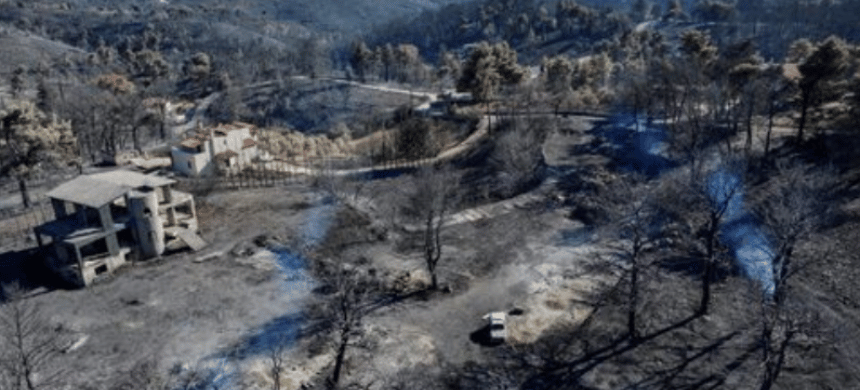Greeces most devastating wildfire of the year, which had raged on the outskirts of Athens, began to subside on Tuesday due to weakened winds, temporarily halting the blaze that had claimed one life and left a trail of destruction, burning cars, buildings, fields, and forests.
Since Sunday, hundreds of firefighters, supported by 10 water-bombing aircraft, had been battling the inferno as it advanced from a forest into the northern suburbs of Athens, destroying homes and causing widespread panic in neighborhoods that had not witnessed such a close threat to the city center in decades.
“The situation has improved, but there are still sporadic blazes. At the moment, we don’t have any new fire fronts, only some flare-ups, but we remain on high alert,” said a fire brigade official.
READ MORE — Greece’s Golden Visa Program Receives Record Applications in 2023
The government has announced compensation and relief measures for the victims of the fire, which Greece’s National Observatory estimates has damaged around 10,000 hectares of land. Prime Minister Kyriakos Mitsotakis was expected to chair a ministerial meeting about the fire on Tuesday evening.
As the skies over Athens cleared of smoke, firefighting aircraft arrived from France and Italy as part of a European civil protection mechanism, according to a government official. The Czech Republic also sent 75 firefighters and 25 engines to assist ground teams.
On Monday, the fire reached the suburb of Vrilissia, about 14 km (8 miles) from central Athens, where a 64-year-old woman was found dead inside a local business, according to witnesses.
The cause of the wildfire has not yet been determined.
With high winds expected to return, Greece will remain on high fire alert until Thursday, with temperatures forecast to reach up to 40 degrees Celsius (104 degrees Fahrenheit).
Summer Cycle
Wildfires have long been a recurring issue in Greek summers, with the deadliest blaze killing 104 people in the seaside town of Mati in 2018. However, climate change has intensified the risk, bringing hotter weather and less rainfall.
This year, Greece experienced its warmest winter on record and is on track for its hottest summer, with little rain in many areas.
“The wildfire exhibited all the characteristics that we, as firefighters, dread in a forest fire: a combination of hot, dry, and windy conditions,” said Nikos Lavranos, head of the Greek Federation of Fire Service Employees, on Greek TV.
“It was extremely aggressive, difficult to manage, and unpredictable,” he added.
Blazes have erupted across southern Europe this summer, including in Spain and the Balkans.
On Tuesday, residents and firefighters returned to some areas of Athens to assess the damage—kitchens and living rooms blackened by fire, ceilings collapsed, and cars reduced to charred frames.
“My house was completely destroyed, even the walls collapsed. There’s nothing left,” said 70-year-old Sakis Morfis. “The only thing I cared about was saving my dogs, so I left everything else behind.”
More than 30 areas were evacuated, including at least three hospitals, and parts of the wider Athens region experienced power cuts.
On Tuesday, the climate crisis and civil protection ministry announced measures that include rent subsidies, a three-year property tax exemption, and financial aid.
Opposition parties criticized the government, accusing it of not doing enough to prevent the disaster.











